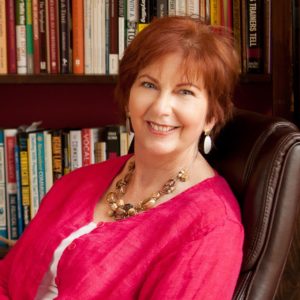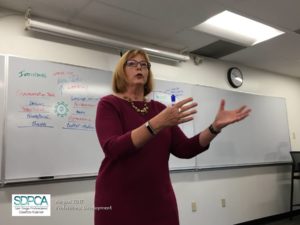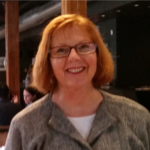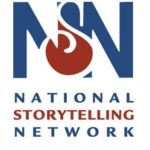At the National Storytelling Network, our mission is to advance all forms of storytelling within the community through promotion, advocacy, and education.
STORY NOW! Interview Series
The theme of our 2019 annual conference was Story Now!
Now! From the boardroom to the classroom, and the page to the stage, personal stories and folktales are catalysts for change in every aspect of our lives.
Now! We are witnessing the power of stories to tear down the walls that divide us, build bridges between people and cultures, and connect us, human-to-human.
In this interview series, we’ll talk to storytellers who exemplify this Story Now! movement.
Each month we’ll sit down with an NSN member or member organization, from around the globe, and go behind the scenes to explore how they are personally harnessing the power of storytelling to tear down walls, to be a catalyst for change and connect us human-to-human. Through one-on-one, in-depth conversations, we’ll discover the type of storytelling they do, how they do it, who their audience is and, most important, they’ll give examples of the real world, tangible results they get.
 Kathy Greenamyre is NSN’s Community Relations Manager. She will be conducting interviews and contributing content each month for our Story Now! Interview Series. Kathy is the owner of a video production company. She’s interviewed hundreds of people over the past 12+ years. Her passion is to discover the world (and maybe even learn how to fix it) through listening to, recording and spreading personal stories.
Kathy Greenamyre is NSN’s Community Relations Manager. She will be conducting interviews and contributing content each month for our Story Now! Interview Series. Kathy is the owner of a video production company. She’s interviewed hundreds of people over the past 12+ years. Her passion is to discover the world (and maybe even learn how to fix it) through listening to, recording and spreading personal stories.
Karen Dietz – San Diego, California
Karen Dietz, Ph.D. — Transformational Communication and Transformational Storytelling
Growing Your Impact and Influence
“What has surprised me the most is that over the last 20 years I’ve been doing this work, when I ask a client what their main take-away is from our working together, 100% say ‘confidence’.” Karen Dietz
Kathy Greenamyre: You say storytelling in business is a social justice initiation that can dissolve barriers and move the organization forward. Explain.

Karen Dietz: Organizations have many of the same characteristics of communities, groups, societies, cultures, etc. In other words, within a company (especially larger ones), there are people whose voices/stories are not heard. They are often ignored or put down. We see this in any organization that has silos and stereotypes. So, a lot of my work in organizations is to help everyone so they feel seen, heard, and valued, where their human rights are supported, and where equal opportunity can improve. Business is a human rights arena. If you are working in business storytelling, at some level you are dealing with social justice issues.
KG: As you believe, we all live in a whole network of stories, a web of stories. How does this knowledge help business people?
K. Dietz: This is a notion from Ella Saltmarshe who wrote an article about stories being a web, a light, and glue in cultures and organizations. It’s brilliant and I wish I’d thought of these! It’s easy in any organization to compartmentalize. As a result, silos are common, as is isolation. When I work with leaders to help them understand that everyone, including themselves, lives in a network of stories, I use these terms of web, light, and glue. I see the lightbulb come on. These are critically important ideas for anyone in an organization to grasp. It sets the foundation for how knowledge flows around the organization, and it helps avoid the danger of a single story – i.e. the brand story. Again, this opens up for business people their very narrow definition of storytelling into a living breathing network of stories that they operate in every day, and can use to help people, help their companies, help their customers, and help society.
KG: What are the 7 Signature Stories?
K. Dietz: Every business storytelling professional has the list of story types they advocate a business or leader master. Some have a list of 4. Some have 10. Some have 5. I think any list between 5-7 is about right for people to work with. Four seems a little thin. Ten seems a bit much. I developed my list over the years, based on the most common stories my clients needed help with. You’ll see my list is also focused on the results a particular story type can produce. They all generate trust. Every client receives this list. I focus on different stories on the list, depending on what the client needs in the moment.
KG: What about the neuroscience of storytelling. The core of what makes us human.
K. Dietz: Well, that’s a tall order and at least a 30-minute webinar. Basically, MRI scans and research into the neuroscience of storytelling over the past 10 years demonstrates what happens to the brain when it’s on a story, and how different that is when the brain is on information/data. When the brain is on story, 7+ areas of the brain are lit up. When a storyteller and story listener are engaged in a story in real-time, they’ve shown it only takes 1-2 seconds for the brains to wire together. This is called neuro-coupling. The more the senses are triggered when telling a story, the greater the comprehension is of the story. In other words, it’s remembered and can be retold. When the brain is on info, only 2 areas of the brain are activated. The brain gets easily tired trying to make it meaningful, file it away in the brain, and remember it. Comprehension is low. Most of the time, the brain simply processes information, but it doesn’t stick. In the end, when a
brain is on data/information, the result is very poor decision-making. When the brain is on a story, decision-making improves – which my clients continue to validate.
 KG: Describe your role as a coach and trainer. Who do coach? Who do you train?
KG: Describe your role as a coach and trainer. Who do coach? Who do you train?
K. Dietz: I coach leaders, rising stars, and organizations who wants to master storytelling. Recent clients include CEOs, CFOs, VPs, Executive Directors, marketing intelligence groups and business development groups in major corporations. I work with managers – usually in technology companies – and engineers, who I love working with. I’ve worked with book authors and professional speakers. I’ve worked with a number of nonprofits to help them raise lots of money. I’ve worked with global companies collecting their customer stories so those stories can make a difference. I like the variety 🙂
KG: How do you market yourself / your business?
K. Dietz: Through referrals, speaking, my newsletter, LinkedIn, and networking. It’s always a work in progress. Marketing changes over time. I have to stay sharp and continue to upgrade my marketing skills.
KG: When (or if) you get resistance from CEOs, managers, employees about your mission and training, what are people usually leery about initially?
K. Dietz: They want to know I have a defined process and can guide them to the results they want in a defined amount of time. Their initial thought about storytelling is that it’s a story formula to plug and play. If they are a prospect or a client, I quickly shift their thinking. There are many people out there with a lot of biases about storytelling. Trying to convince someone about storytelling is like banging your head against a wall – because they are closed-minded. Other leaders I’ve met think they know everything about storytelling and these folks are like wet sponges – full of their knowledge and not a new drop can be added. So, I let them be. For many years I curated and reviewed the best articles I could find on business storytelling as a way of shifting biases in the marketplace. That was effective for anyone open to learning more.
KG: You’ve worked with businesses for years using storytelling. What has surprised you most?
K. Dietz: What has surprised me the most is that over the last 20 years I’ve been doing this work, when I ask a client what their main take-away is from our working together, 100% say “confidence”. What has pleased me most are different results they achieve: sharing their stories has changed laws, raised millions, launched successful global projects, built communities, and accelerated careers.
KG: Briefly describe your story maturity model that allows others to know what their story IQ is.
K Dietz: Well, at its simplest, the story maturity model is a way to look at an organization and understand their sophistication with storytelling. A common entry point for storytelling in an organization is around sales or fundraising. This is transactional storytelling: I tell you a story, you give me money/buy my product or service. But that’s not building sustainable relationships. So eventually, organizations move on to relationship storytelling: let’s share stories so we have a relationship, and we can influence each other. The most mature/sophisticated organizations realize storytelling is transformational, and they use the sharing of stories up and down the organization to generate co-created stories that transform people and systems. Once I understand the story maturity of an organization, I know better how I can help them, and how to move them up the model.
KG: How can one use storytelling for better decision making?
K Dietz: Well, the best research I’ve found on this is from Angelika Dimoka, Professor at C. T. Bauer College of Business, University of Houston. In my own action research that I do with clients, we compare hearing a story to hearing information, and they always tell me the story will help them make better decisions.
KG: What results are you trying to produce in some of your client companies?
K. Dietz: The results they want. It’s usually nailing a high-stakes presentation, building a high performing team, working with customer stories, being a better leader, culture change, etc. The results I want are happy empowered customers who can now change their world because they have ethical storytelling skills.
KG: Talk a bit about where you were born and about the family you grew up in. And if there were any early influences that might have led you to a career in storytelling.
K. Dietz: I grew up in the Army living all over the world. By the time I finished high school I’d lived 10 different places and went to 10 different schools. I loved it. My parents made sure my brother and I knew that “home” was not a geographic place, but wherever the family is. That’s given me tons of flexibility and opportunity over the years. I know I can make friends anywhere. But I also came from a family who weren’t storytellers, and communication about important matters was thin. Then I went to college and graduate school and learned to become very very boring. It wasn’t until I was exposed to real live transformational storytelling that I learned a very different and powerful way to be. The people who showed me this are sacred storytellers Ron Evans, and then Reuven Gold.
KG: You’re a lifetime member of NSN and were Executive Director of NSN at one point. What originally drew you to join NSN?
K. Dietz: The opportunity to advance the awareness and influence of storytelling across the nation.
KG: What have been the benefits of being a member of NSN?
 K. Dietz: Community, connection, ongoing upgrades to my own storytelling craft.
K. Dietz: Community, connection, ongoing upgrades to my own storytelling craft.
KG: What could NSN provide to help you grow your business?
K. Dietz: If NSN had a certification in business storytelling, that would be helpful. Or online masterclasses with top storytellers. With my schedule, it’s hard to travel to take workshops.
KG: Finally, given your long history with NSN, what in your opinion can NSN do (a lot better job of) to grow and spread storytelling throughout this country and the world to bring about real change. Real transformations in the culture. (tall order I know 🙂 ).
K. Dietz: The 3 reasons anyone joins an association are for knowledge, community, and opportunities for business growth (networking). I think the question to ask members, staff, and the board, is “What can we do to improve all of these three?” NSN might also want revisit its Vision. Currently it’s “A world in which all people value the power of storytelling and its ability to connect, inspire, and instill respect within our hearts and communities.” That’s nice. Respect, connect, and inspire is good. But how specifically does any of that improve the world? What happens to people and communities when connection, inspiration, and respect is alive and well? What are people able to do once connected and inspired? Storytelling is powerful because when people are connected, aligned, and inspired anything is possible. It’s how the world is changed, and lives are bettered. NSN could give people the tools to have that be so. But as it stands now, if I was a new visitor to the website, I wouldn’t know that. If I’m a returning member to the website, I still wouldn’t know that, IMHO. (hey, you asked 🙂 ).
To contact and follow Karen:
Karen Dietz, Ph.D. — Transformational Communication and Transformational Storytelling
Growing Your Impact and Influence
C 619.890.5222 W www.karendietz.com
Book: Bestselling author of Business Storytelling For Dummies
Coach & Trainer: Fortune 1000, TEDx San Diego
Speaker: TEDx America’s Finest City San Diego, Vistage speaker
Faculty: UCSD Extension Business & Leadership
Website: https://www.juststoryit.com/
LinkedIn: https://www.linkedin.com/in/karendietz/
Facebook: https://www.facebook.com/dietz.karen
Twitter: https://twitter.com/kdietz/
Email:
TEDx Talk – Karen Dietz
“Through the Back Door – Find the Unexpected Through Story: Karen Dietz at TEDxAmericasFinestCity”
https://www.youtube.com/watch?v=ahN_FDHFWmg
NSN loves publishing items submitted by the storytelling community! If you’re interested in writing something for publication on the NSN website, newsletter, or Storytelling Magazine please contact the NSN office for more information.
Contact the National Storytelling Network
 c/o Woodneath Library
c/o Woodneath Library
8900 N.E. Flintlock Road
Kansas City, MO 64157
Telephone: (800) 525-4514
Website: https://storynet.org
Email:
Find us on social media!
Facebook: https://www.facebook.com/National-Storytelling-Network-217381542906/
Twitter: https://twitter.com/NSNStorytellers
Instagram: https://www.instagram.com/nationalstorytellingnetwork
YouTube: https://www.youtube.com/channel/UCBedmDdaRi9N-4Hs-QeYNqw
